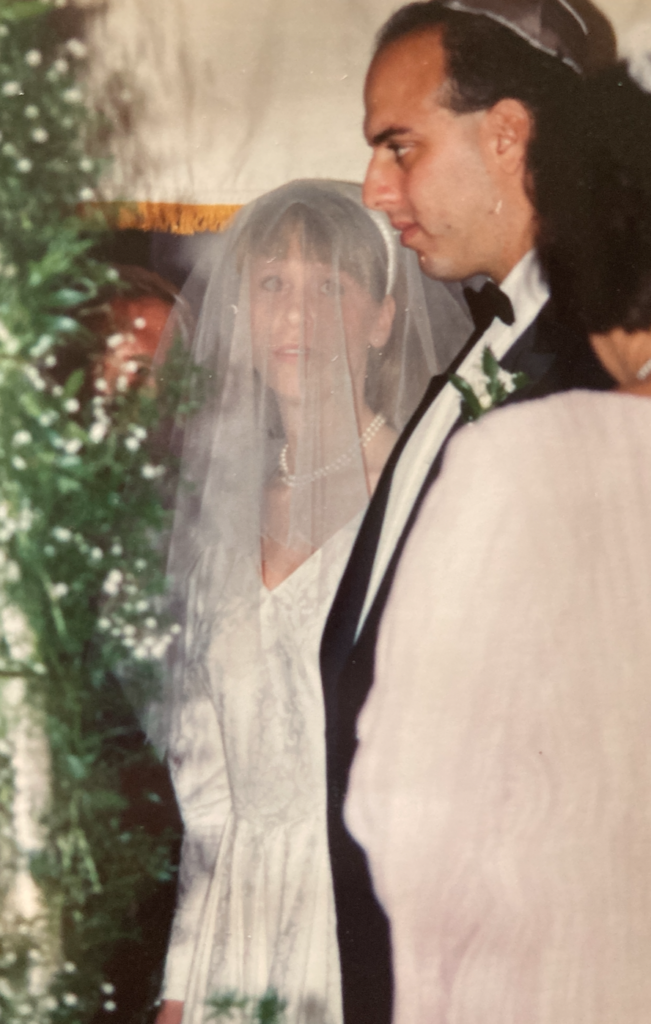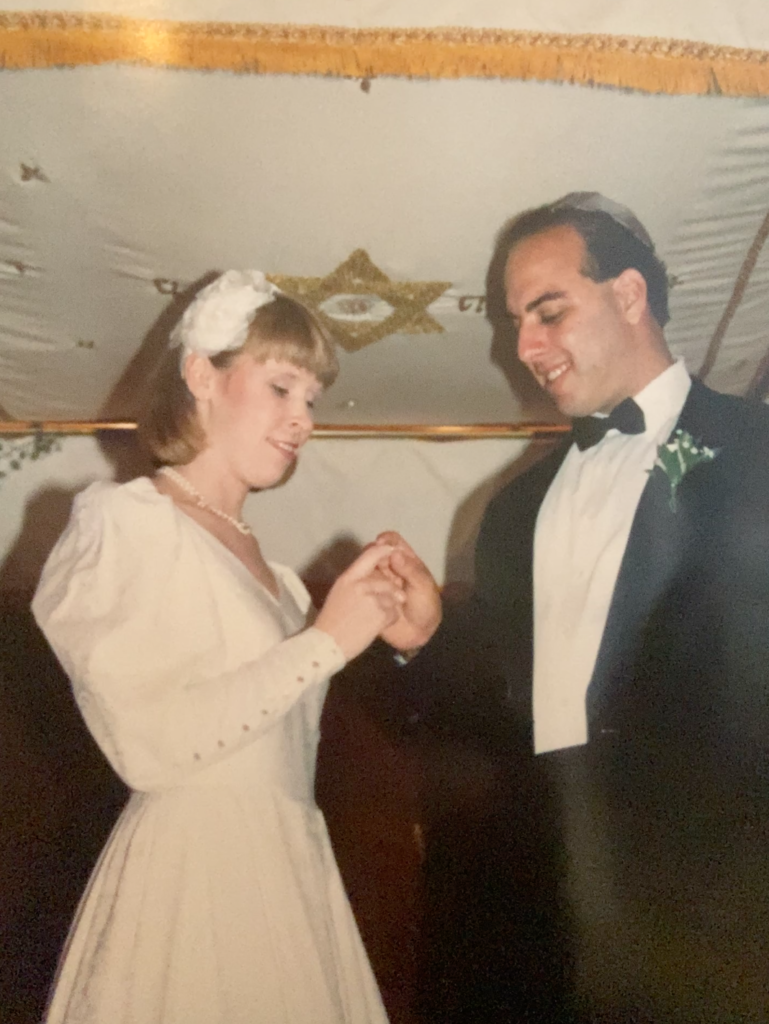I walk in slow steps around my beloved, lifting up the skirt of my ivory wedding gown so not to trip. Soon I lose count, for this moment is full of emotions—my heart pounding in my chest, my cheeks flushed: I am a newly minted Jewess.
When I got married I was 23 and my father, a Norwegian non-Jew, stood under the chuppah—the wedding canopy—with me, on his bald spot a satin kippah rested a little crooked, awkwardly. Each time I circled the man who was to become my husband, dad whispered the numbers a little too loudly as I passed by him.
“One. Two. Three…”
According to Jewish tradition, I was to circle my future husband seven times before the rabbi would speak, recite prayers, and marry us.
Dad made it his job to help me not lose count the way he may have thought I had lost m yself a little in the process of my orthodox conversion to Judaism. Worldly and well-read, he supported me in my choice. “If that is what makes you happy,” he said when I told him about keeping kosher, observing the Sabbath and all the Jewish holidays and life-cycle events that would be part of my new life.
Nevertheless, and despite being an avowed agnostic, when he walked me down the aisle just minutes earlier, he squeezed my arm tight and smiling at family and friends, he leaned his head toward mine and whispered, “Don’t worry, if you don’t like it, you can always convert back.”
Little did he know, I would take to heart the saying, “once a Jew, always a Jew.”
*

That day, the ritual of the bride circling the groom was a metaphor of my own, personal revolution: I had discarded the old (familial) system that I had grown up with in Norway—measured, stoic, with few traditions and zero spirituality—in favor of a new one that promised me something I had yearned for since childhood: structure, accountability, and family before anything; but also a sense of something larger, perhaps even mysterious, that might connect me to deeper meaning.
Seven revolutions around the sun/son, as it were. Although Judaism is matrilineal, it’s still a patriarchal social model that has been the religion’s backbone since time immemorial. I search for my father’s eyes at each revolution.
“Four.” My circular movements are meant to symbolically separate my sweetheart from his family as together we will create a new family structure for our couple.
In Judaism, the number seven is unique and epitomizes holiness and completion. The tradition teaches that God created the world in six days and rested on the seventh, hence, together, the six days of creation and the seventh day of rest, becomes a complete week, part of a life lived fully. When a couple is about to set up a home and begin a life together, it is fitting that this symbolism of creation-perfection be reflected in the marriage ceremony.
“Five,” dad says louder now, sensing my trust in him, as if with his counting he’s saying “I’ve still got you, my little girl.”
I worry the rabbi or my in-laws, who also stand under the chuppah, hear him. “Shhh…” I whisper back, like we are in cahoots.
My husband-to-be was born Jewish and his parents were not happy he had fallen in love with a shiksa—a derogatory term for a non-Jewish woman. I was prepared to do anything for us to be together, to please them. My future mother-in-law slipped me a book about the history of the Jewish people, maybe hoping it would scare me away—it’s not a bright story, after all. But reading, I saw perseverance, survival, and a deep love of family, of tribe.
This, I thought, was worth a revolution, and I began a three-year long learning period with their rabbi. During this time, I changed the way I dressed as I began to wear more modest clothing. I changed the way I ate, since pork and shellfish were out and I no longer mixed meat and milk in the same meal. I changed the way I thought about the world, because suddenly I looked at gender differences with less of an adamant feminist slant, contrary to the way I had been raised in Norway’s egalitarian society.
“Six,” I hear dad’s hushed voice. I begin to feel dizzy from all the turning. About a quarter of the guests in the synagogue are family and friends from Norway and—for most of them—everything is strange and new. I write and print pretty pamphlets with explanations to make sure they follow along, that they understand why I circle around seven times, why my husband steps on and breaks a glass at the end of the ceremony.
I’d committed to embrace not just my Jewish husband but also all the traditions, with rules and regulations about what to eat and what not to eat, when to work and when to rest, when to have sex and when to abstain. It’s easy to get dizzy from all of it, to feel unmoored from my birth-clan, while at the same time admitting to be happily tethered to an ancient, existential anchor.
Finally I hear “seven,” and dad winks. I stop, standing next to the man that will be my husband for the next 23 years.
*

But nothing lasts forever, and when we divorce, his family—my complicated but beloved Jewish tribe—disowns me. Then, barely two years after my divorce, while still wallowing in grief, my father dies. The losses devastate me. The three most significant adult male figures in my life, who had all been my confidants, gone. My husband, my father-in-law, my father.
I realize then, more than ever, that life is a series of tiny and great revolutions, and that in order to survive, to thrive, I need to embrace ongoing change. It takes time, but through a lot of mindful work—therapy, yoga, meditation, and even hypnosis—I learn to appreciate that my ability to evolve, to revolutionize myself, is in fact a gift.
*
Thirty-five years after I walked in circles around my first husband-to-be, I am planning my second wedding, my second chuppah. At 57, I’ve come to appreciate that my new partner, who is also Jewish, also a convert, shares my revolutionary abilities, and as such, is my perfect match. Together we welcome change, as challenging as it can be, and our motto is “to be in the process.”
Secretively, I also recognize, and embrace—Freud be damned—that he fills the void created by my mid-life losses. He’s 27 years older than me and is as much a father-figure as a lover. I decide to own it, boldly, defiantly. By choosing to be together, to make an unusual couple, ours is an act of rebellion(our own small revolution?) against the system of social expectations, that we choose partners closer to our own age.
My father won’t be there to count to seven as I circle my sweetie under our wedding canopy, with family and friends looking on. I will miss him, but I won’t be nervous the same way I was at 23 because, for me, the beauty of experience and aging is that revolutions don’t seem so scary anymore, but rather a necessary and even beautiful part of growth and new beginnings.




